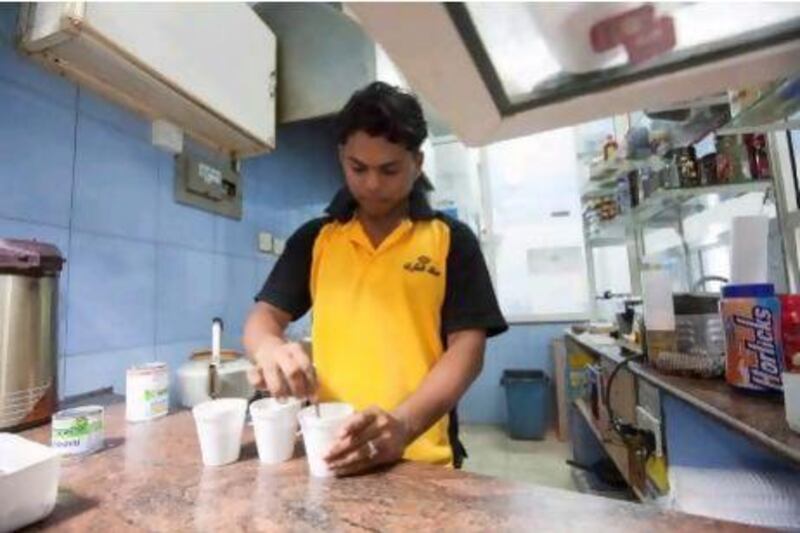A car creeps forward in the inky darkness. The driver parks and flashes his lights.
A pair of men rush forward to a hand that emerges from the driver's tinted window. Money is exchanged and the car disappears into the night.
This is no illicit encounter - just typical 3am business at Malik Al Karak Cafeteria, the city's premier karak tea cafe.
Karak, said to mean strong, is the subcontinental drink that the UAE has embraced as its own - a concoction of black tea, cardamom, saffron, condensed milk and generous amounts of sugar.
It is the drink of carpet merchants and car dealers, used to seal a deal or as a symbol of hospitality in majlises across the country.
Above all, karak is a sweet addiction for the city's night owls, and Malik Al Karak is their cafe.
"Morning, evening, everybody talks about Malik Al Karak," said Ali Mohammed, 22, from Fujairah.
For him, it is an essential part of the nocturnal cruise.
"I go cruising any time until I get bored and go to sleep. We are used to staying up," he said.
Malik Al Karak, which means King of Karak, is the undisputed top dog of RAK's multitude of karak cafes. Ramadan sales are 3,000 cups a night, and even on a sultry summer's weeknight the cafe brews 1,500 cups, or 266 litres.
At 3am, customers belong in equal parts to the ageing night and the emerging day ahead.
There were "gangstas" who boasted of their ties to the east coast rapper Dangour, fishermen setting out to sea, Emirati soldiers on annual leave and taxi drivers ending 15-hour shifts with a cup of tea.
The secret ingredient?
"Maybe saffron," said Zayed Thottungal, a brewer at the cafe. "It's very technical."
The costly spice is kept in a salt shaker.
Mr Thottungal and Harris Paravantepoyil, both 20 and from Kerela, work from 4pm until 4am. They rush outside at the beckon of a horn, and even at this hour the blaring never stops.
Peak hours are from 5pm to 10pm on weeknights, but from Thursday to Saturday 3am is "full rush". Even on summer weeknights, six people are working at 2am.
Mr Thottungal also makes sandwiches flavoured with pineapple jam, processed cheese spread, chili sauce or honey.
But it's the tea that sells.
"When I was a baby I was raised on karak," said Mustassim Jamal, 23, an Emirati who drinks more than 10 cups a day.
As an adult, he is almost apologetic about his late-night tea cravings.
"Boys like going for karak and driving around," Mr Jamal said. "I swear, I'm straight [honest], but I take karak and drive."
"Rounding", a popular term for aimless cruising, is a popular RAK pastime and an essential part of Malik Al Karak's business.
Before RAK had a mall, cinema or park, entertainment for youth consisted almost entirely of "rounding" for tea. The tradition has persisted.
"I don't want shopping, I want rounding in a car," said Majid Abdulla, 38, an Emirati.
"All people like to speak to their friends in the car and you can see all places in RAK are beautiful when you're rounding in the car. When friends are rounding, they stop, say salam and take the karak."
Ghaleb Al Shehhi, also a UAE national, believes Malik Al Karak's success originated with mariner ancestors in India.
"Because in old, old years, they went to work in India, they drank and drank and drank it, and then the Indian men came to work here in the Gulf after petrol," said Mr Al Shehhi.
Abdullah Mohammed, 25, a Pakistani businessman born in RAK, has considered opening his own cafe near the Kuwaiti street market where he owns abaya boutiques.
"These young shabab [guys], they make rounding, rounding, rounding on Kuwait street, make karak and then come back," Mr Mohammed said. "At this time, there is no place for them and they go only to the Corniche - and to karak."
Mr Mohammed is also a 4am addict. "The first time they opened this shop, the municipality came and asked, 'What do you put in your karak? It's like a drug? Too many people are drinking it'."
He insists it is innocent.
"There's no crime, nothing, everyone is just enjoying and sitting until morning, enjoying like this."
By 4.30am, the only traffic on the city's roads are cyclists, joggers and newspaper-delivery motorcycles. Mr Paravantepoyil mops the floors as the last customers disappear.
"Sleeping," he says with a smile.
The shop shuts as a minaret's speaker crackles over the city. In little more than an hour, the shop's doors will open again.






